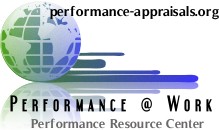Year Long Communication Supercharges Employee Performance
Ongoing Performance Communication
If you look at performance reviews and how they are often used in the workplace, you come across a startling, scary phenomenon. Many, if not most, managers and HR departments see the
performance review as a once-a-year event. It’s “something to
get out of the way so real work can get done.” This view and
the resulting behavior virtually guarantee that the performance
review meetings will fail miserably and ensure that there will be
a lot of bad feelings associated with the meetings. Why?
Jessica in Chapter 1 (from The Manager's Guide to Performance Reviews)
is the prototypical manager who sets
up performance reviews so they fail. We identified some of the things she does to destroy any value they might have, but let’s consider one more thing.
Every year, once a year, Jessica meets with Freddy, one of her staff. Now, Freddy has always “come out OK” from the meetings. This year, in the annual meeting, Jessica says to Freddy, “Freddy, I’m sorry to say that your performance this past year has been horrible and, if it doesn’t improve in the next three months, we’re going to have to let you go.” How do you think Freddy is going to react to this bolt of lightning?
If you manage performance well, you can conduct performance reviews in about 15 minutes! Performance management saves time, over the year.
Of course Freddy will be upset because, for all intents and purposes, he’s been shanghaied. After he gets over his shock,
if he doesn’t do anything stupid, one of his questions is going
to be “Why the hell didn’t you tell me earlier?” A very good
question!
Surprising Freddy this way is certainly going to make the meeting exceedingly unpleasant. It also calls into question Jessica’s motives. If Jessica is interested in helping Freddy succeed, than doesn’t it make sense to bring up the performance issues much earlier in the year and work with him so he can improve? If, however, Jessica’s motive is to get rid of Freddy, then it makes sense to not tell him until the performance review, so he has less chance to fix things. We can’t know Jessica’s motives, but one thing is sure. By dropping this bomb, she’s destroyed any trust or positive relationship she might have had with Freddy. That’s bad enough, but she has also damaged her relationships with all her staff.
This is not going to remain a secret: Jessica’s other employees are going to know.
Performance reviews done in the absence of ongoing communication about performance hroughout the entire year cost big time. Ongoing performance communication is a two-way
process throughout the year to ensure that job tasks stay on track, that problems are redflagged before they grow, and that both manager and employee keep current.
Ongoing communication isn’t just to build and maintain good relationships between manager
and employee. It might be that that is the least important part of the process.
In terms of the success of the company, the work unit and the manager, the most important function of
ongoing communication is to help identify problems early so they can be addressed early.
Let’s look at Freddy again. Assuming that his performance has dropped significantly during the past year, the company and the work unit have suffered from the performance deficits for a complete year. Maybe they’ve lost sales or customers. Maybe the quality of their products has declined. Maybe new product ideas have dried up. Whatever Freddy was expected to be accomplishing, his poor performance has hurt. Even if Freddy cleans up his act in the upcoming year, whatever was lost is lost forever. That’s not a “touchy-feely” loss. That’s a bottom line financial loss that can never be recouped. Contrast this result with how this situation is handled by Mike, our excellent performance reviewer. Early in the year, Mike notices some things that hinted at problems with Freddy’s performance. While Jessica felt she was too busy to watch over employees, Mike felt it was important to keep at least one eye on things during the year. Rather than waiting until the end of the year, he intervened. Equipped with some observations about Freddy’s behavior, he talked with Freddy, or rather led a discussion with Freddy about performance. It turned out that Freddy was having some family problems.
Mike and Freddy
worked together to ensure
Freddy got the help he needed and, within a few
weeks, Freddy’s work started to return to his previous levels. Do you see the difference? Since Mike paid attention and acted quickly,
losses to the company
and work unit were minimized.
A side benefit was that Freddy very much appreciated Mike’s help and other employees heard of Mike’s efforts. The result: better relationships all around.
Ongoing performance communication can be summed up in a single, simple two-word phrase—no surprises! By the time the performance review rolls around, the employee should pretty much anticipate the outcomes of that meeting. Also, there should be no surprises for the manager. Any problems that arose during the year should have been identified and discussed
at the time. Solutions might already be in place.
